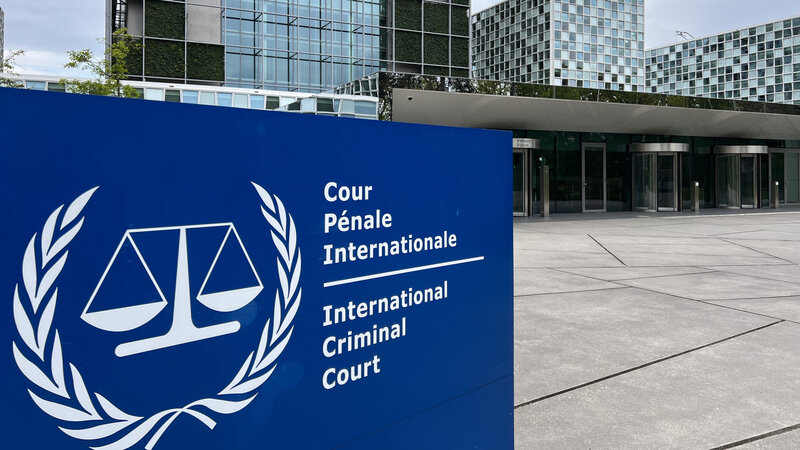Posted on May 20, 2024
The International Criminal Court is seeking warrants for Israeli and Hamas leaders
5.95K
9
3
3
3
0
Posted 6 mo ago
Responses: 2
Excellent post. Thank you for sharing this shipmate. This is awesome news. :-]
(2)
(0)
Join Adam Carolla and Dennis Prager: No Safe Spaces
http://www.NoSafeSpaces.comHelp fund the new film that will expose the most dangerous place in America for ideas and debate: The college campus.
Good luck! The hypocrite UN now knows that Hamas is nada As israeli forces closing to Rafah to destroy the last battalions of palestinian nazi butchers and finish the Intifada.
Biden Is catering to Palestinian Nazi or Arab nazi sympathizers in a few swing states is gonna make a difference in November.
American kids are brainwashed to hate Jews like in this parody, from 2018.
It's interesting that college campuses will allow students to put up the ukraine flag banocta Israel flag. They say death to america and death to Israel. People who are jewish or who care about israel with money are really going to Foxtrot over those schools who get american taxpayer money , but yet side with Palestinian Nazis Democrats.
This is the achilles heel of president biden besides him denying that inflation is caused by him and his party that keeps spending/borrowing $1 trillion dollars every six months over budget.
Foxtrot Palestinian nazis!
Israel will survive even if nuked by Iran.
President Obama and President Biden both gave concessions to Iran and gave them billions of dollars so they can continue on their nuclear campaign as well as to fund Hamas and Hezbollah.
President Biden is going to get impeached for withholding.Specific laser guided bombs to israel. President biden is a threat to democracy because he doesn't follow the rule of law. He disobeys the supreme court and withholds aid to Israeli It has already been signed into law. President Biden is a scofflaw and will be voted out in November.
https://youtu.be/zfYOx1siNTw?si=npGWRjyUHqtk7Kgh
SGT Ruben Lozada
PO1 William "Chip" Nagel LTC Eugene Chu
SMSgt Lawrence McCarter Lt Col Charlie Brown Lt Col John (Jack) Christensen CPT Jack Durish LTC Stephen F. CSM Charles Hayden 1SG Russell Scott 1SG Patrick Burke SFC Dr. Jesus Garcia-Arce, Psy.D SFC Joe S. Davis Jr., MSM, DSL SFC John Davis LTC Trent Klug CDR Andrew McMenamin, PhD 1st Lt Padre Dave Poedel CPT (Join to see)
LTC Thomas (Tom) Jones LTC Marc King
Biden Is catering to Palestinian Nazi or Arab nazi sympathizers in a few swing states is gonna make a difference in November.
American kids are brainwashed to hate Jews like in this parody, from 2018.
It's interesting that college campuses will allow students to put up the ukraine flag banocta Israel flag. They say death to america and death to Israel. People who are jewish or who care about israel with money are really going to Foxtrot over those schools who get american taxpayer money , but yet side with Palestinian Nazis Democrats.
This is the achilles heel of president biden besides him denying that inflation is caused by him and his party that keeps spending/borrowing $1 trillion dollars every six months over budget.
Foxtrot Palestinian nazis!
Israel will survive even if nuked by Iran.
President Obama and President Biden both gave concessions to Iran and gave them billions of dollars so they can continue on their nuclear campaign as well as to fund Hamas and Hezbollah.
President Biden is going to get impeached for withholding.Specific laser guided bombs to israel. President biden is a threat to democracy because he doesn't follow the rule of law. He disobeys the supreme court and withholds aid to Israeli It has already been signed into law. President Biden is a scofflaw and will be voted out in November.
https://youtu.be/zfYOx1siNTw?si=npGWRjyUHqtk7Kgh
SGT Ruben Lozada
PO1 William "Chip" Nagel LTC Eugene Chu
SMSgt Lawrence McCarter Lt Col Charlie Brown Lt Col John (Jack) Christensen CPT Jack Durish LTC Stephen F. CSM Charles Hayden 1SG Russell Scott 1SG Patrick Burke SFC Dr. Jesus Garcia-Arce, Psy.D SFC Joe S. Davis Jr., MSM, DSL SFC John Davis LTC Trent Klug CDR Andrew McMenamin, PhD 1st Lt Padre Dave Poedel CPT (Join to see)
LTC Thomas (Tom) Jones LTC Marc King
(1)
(0)
Read This Next



 Israel
Israel Palestine
Palestine War Crimes
War Crimes


